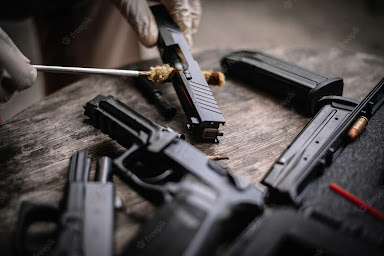In order to preserve their safety and reliability, firearms need to be cleaned and cared for meticulously. Each time a weapon is fired, tiny fragments can stick in the barrel, so regular firearm maintenance is critical because these particles gradually accumulate and cause corrosion, which affects the gun's accuracy over time. The good news is that you don’t need to take your gun to an expert every time you need to perform maintenance, just follow these four tips and you could keep your weapon in tip-top shape yourself.
Read the Manual
No one wants to take the time to read a tedious user manual when their shiny new firearm arrives, but not taking the time to at least skim it over once could mean the difference between life and death while using a firearm. It's crucial to study your owner's handbook before dismantling a gun because not all firearms can be taken apart in the same manner. Along with instructions on how to correctly load and disassemble the firearm, and the small but important differences that various ammunition feature, your owner's handbook should also offer you advice on how to maintain the best operating condition. For more detailed information on ammunition options, especially in terms of self-defense and hunting, you might want to check out this comprehensive guide to hollow point bullets.
If you have lost any of
the documentation that comes with your weapon, you can usually find the manual
by searching online or contacting the manufacturer.
Use the Correct Gear
People who own guns are infamous for trying to make their own
maintenance fixes. Stop doing this. When it comes to regular service and repairs,
the smartest choice is to use products made especially for washing, greasing,
and preserving your gun. WD-40 isn't the solution to all your problems, and it
won't be suitable for your firearms either. The only lubricants you should be
using are those designed expressly for use with weapons since a firearm must be
able to withstand extreme temperatures, abrasion, displacement
in the chamber, and corrosion.
Inspect Often
While experienced firearms users are mindful that they should always examine their firearms both before and after each usage, some new owners may not be aware that we need to examine our weapons often. Firearms that spend the majority of their time in a holster often take wear-and-tear damage because of the way we carry them, and they frequently get blocked with trash and rust. Firearms carried on a regular basis should be given a once-over every day, whereas firearms kept at home or in a vehicle need a weekly assessment. Being aware of problems early on, or preferably before they occur, is the best way to maintain your weapon. You should stay on top of any changes that need to be made, and buy new necessary parts, such as these Thermold Magazines, to ensure your firearm is ready to use and works at a high standard whenever you reach for it.
Final Touches
Firearm fanatics disagree with the use of grease on a weapon's moving parts. Some folks assume that by doing so, the weapon's mechanisms will be damaged and won't work correctly, despite no solid proof to support this assertion. Keep the moving components of your pistol in good operating condition by using modest amounts of anti-corrosion lubricant to keep them from suffering a jam.
The owner's manual
for your specific weapon should recommend the kind of lubricant to use. Your
gun's outside components also require regular maintenance. Having a cloth
dipped in gun oil available can help you avoid corrosion and other visible
signs of wear and tear. You can also make sure your weapon stays in tip-top
condition by giving it a quick check at the end of each day, or after every
use, and look for any loose components that may need tightening.
You want
your firearm in perfect working condition for when you may need it the most.
After your firearm has been polished and cleaned, maintenance doesn't end
there. We advise storing your rifle in a safe, dry area once you've finished
cleaning it so that corrosion won't affect it and so that you can depend on it
when necessary.

